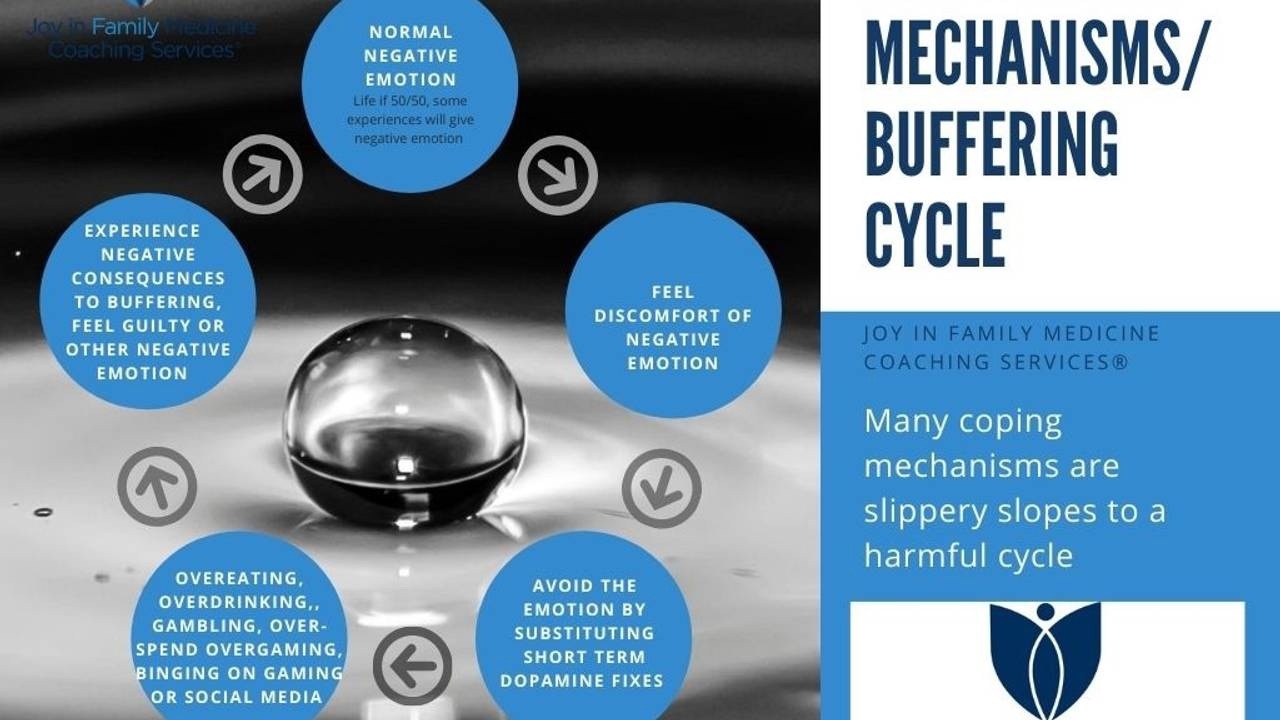
Coping in the World of Medicine: Part 1
We've talked a bit in the past about coping with COVID19. I want to expand to discuss how we as physicians can deal with everyday stressors.
It's not news to say being a physician, especially a family physician, especially a resident or faculty physician, especially in a pandemic, can be stressful. The question is, what do you do with that stress? And what result is your coping mechanism leaving you with? We have previously discussed moral injury and closing the stress cycle, but in this 3-part series, I want to look a bit more into how we cope.
Many physicians have fallen into a pattern of unhealthy coping. In the coaching world, we call that buffering - a subtly harmful activity that a person participates in to deal with (avoid) their negative emotions. In some cases, buffering isn’t even recognized as related to stressors. Often, it’s an indulgence of some sort.
We think of anything used as an escape: overeating, overdrinking, overspending, binging on Netflix, doom scrolling on social media, venting over and over, game-binging, gambling, shopping, porn, etc. But buffering can also be done with things we usually think of as positive – incessant cleaning, overtraining the body, oversleeping, etc. The clues to recognize buffering are that it's done to avoid a feeling and that it brings about a negative consequence.
When we are stressed, overwhelmed, nervous, angry, etc., we consciously or subconsciously look for escapes. We want a substitute. We want good sensations – “more dopamine in my brain, please.” Then we choose actions that give us a quick, temporary, concentrated pleasure that, unfortunately, leads away from growth, gives us net-negative consequences, and spirals into a negative cycle. We feel guilty, out of control, or bloated because of the decisions we made on the spur of the moment. And we don't want to feel that emotion either, so….
Let’s talk about some external modalities to cope that can offer a more favorable result.
What can you do that will give you some comfort and decrease stress without negative consequences? Here are some ideas; you may find others. You want a few that work best for you.
-Are you behind on sleep? Maybe go to bed early.
-Take a walk or sit outside in nature.
-Get in a good-measured workout, hike, or swim.
-Chat with an encouraging friend, family member, or colleague. In fact, many physicians who experience second-victim syndrome do best with peer-to-peer supportive discussions.
-Cooking, dancing, playing music, or painting may serve you through creativity.
-Watch a funny sitcom (not the whole series at once)
-Put on your favorite soundtrack and make your favorite tea.
-Light your favorite scented candle and close your eyes while you rest your head on a comfy pillow.
-Get out and do yard work or gardening (yes, it's therapeutic for many).
-Play a round of golf.
-Hug someone.
-Do something to surprise a friend or coworker.
-Give a compliment or word of encouragement to the grocer.
-Play with your dog or cuddle with your kitten.
-Take a hot shower or tub soak, then put on your most comfy clothes.
No, these things will not erase the difficulties of the day, but rather than buffer with something that will cause you a net-negative effect, leverage positive external coping mechanisms to give a bit of ease and calm.
Next week, we discuss more effective long-term tools from an internal perspective.
Resources:
- Mood Gym – online web-based CBT $27
- Hospital or University/Employer EAP (employee assistance program – free therapy, confidential) – contact your HR department or their website, which should have the details, or your Program Manager can get them for you.
- National Suicide Prevention Lifeline: https://suicidepreventionlifeline.org/ 1-800-273- 8255 and crisis text line at 741-741
- http://www.black-bile.com/ - a website dedicated to physicians suffering from depression and those who care about them
- Your primary care doctor – yes, you should have one that isn't your friend or attending
Have a joy-filled day. - Tonya
Check out our offerings for residency programs and individual physicians.
Join Weekend Reads
Weekly insights, tips, and tools for physicians who want to thrive—plus a dash of fun.
We hate SPAM. We will never sell your information, for any reason.

